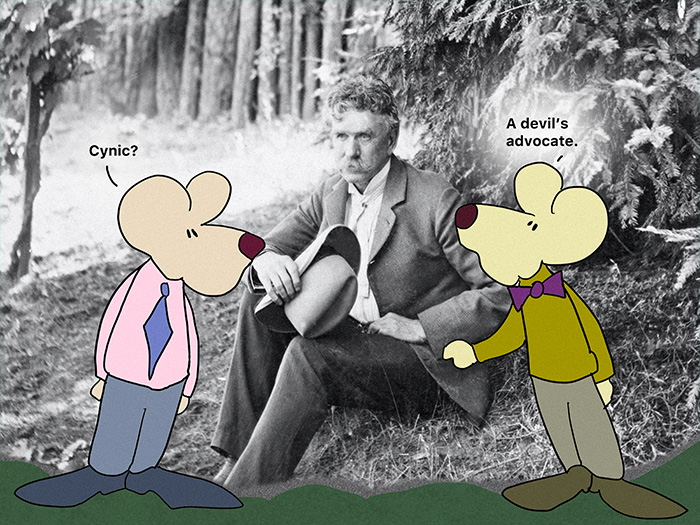He has often been described as sardonic. Sarcastic. Contemptuous.
From those few words, a person might not think much of Ambrose Bierce. Because he could be cynical. I mention him today because of his birthday, this June 24. Born in the year 1842 in Meigs County, Ohio. That’s on the southeastern part of the state, kissing the border of West Virginia.
But before we get to Mr. Bierce, a moment for a sidebar. About cynicism. It’s claimed that at the age of 44, our cynicism starts to grow. But being cynical isn’t necessarily a bad thing, in its entirety, I think.
There always seems to be a constant “movement” to be positive.
“Look on the bright side.”
“Keep your sunny side up.”
“Glass half full.”
But is that constant cheery disposition wholly realistic? Are we meant to always be smiling and looking for the cute little puppy in the box with a red bow? Or even just keeping our chins up all the time?
Of course, cynicism is neither wholly good nor bad. It’s easy to see how you can be too cynical. But. I suggest that it is also possible not to be cynical enough. It seems these days, the world itself is now largely disparaging everywhere we turn. Let’s face it. It seems to be failing in more ways than ever.
In order to effect change, we have to see the problem for what it is. We have to look at things realistically. A little pinch of cynicism might be just the thing.
But I ramble.
Back to Ambrose Bierce. He was a writer and a satirist by profession. And a prolific one at that.
Then there was his cheery motto: “Nothing matters.”
His contemptuous view of human nature, displayed in all his work, earned him the nickname “Bitter Bierce.”
He didn’t start out being a cynic. Or an optimist. Nope. Just a plain old baby, like the rest of us. Bierce was born in a log cabin at Horse Cave Creek in Meigs County. The area he grew up in was filled with people who held Puritan values. And later in life, he often wrote critically of both “Puritan values” and people who “made a fuss” about genealogy.
His parents were poor but held a great love of literature. They instilled in him a deep love for books and writing.
Early on, he was a military man. At the start of the American Civil War, he enlisted in the Union Army. He was known for his acts of courage and bravery all throughout the war. In June 1864, Bierce sustained a traumatic brain injury at the Battle of Kennesaw Mountain. He was discharged from the army in January 1865.
His brain trauma would affect him throughout his life, causing frequent fainting spells and an irritable disposition.
Bierce married Mary Ellen “Mollie” Day, and they had three children. But, he separated from his wife in 1888 after discovering compromising letters to her from an admirer. They divorced in 1904. Perhaps his cynicism was too much for her, and she sought the attitude of an optimist. Or. Maybe this experience caused his cynicism. I don’t know.
After his military service, Bierce became an incredibly busy writer. He worked for newspapers, journals, and more. He wrote books. I won’t list all his work history, as it is long and abundant. But one thing is for sure. Bierce’s long newspaper career was often steeped in controversy. There were several occasions when his columns stirred up a storm of hostile reaction.
He might be most famous for his writing of “The Devil’s Dictionary,” an insightful book.
Late in life, he decided to take a tour of his old Civil War battlefields. In October 1913, Bierce, then age 71, toured the United Stated sites before passing through Louisiana and Texas and crossinCyg by way of El Paso into Mexico.
He disappeared not long after that, never to be heard from again. There are some accounts that say he was accosted by the Mexican Army and died by firing squad. Yet, there has never been a body. And no good proof. But definitely, another misfortune fell upon him.
He made a lot of observations in the Devil’s Dictionary, notably this one:
Misfortune, n. The kind of fortune that never misses.
And so it goes.
==========
“If there was anything that depressed him more than his own cynicism, it was that quite often it still wasn’t as cynical as real life.”
― Terry Pratchett, Guards! Guards
==========
“Life—the way it really is—is a battle not between good and bad, but between bad and worse”
― Joseph Brodsky
===========
“Every ounce of my cynicism is supported by historical precedent.”
― Glen Cook, Shadow Games
==========
Cynic. Or realist. Or grump. Should we always smile?
